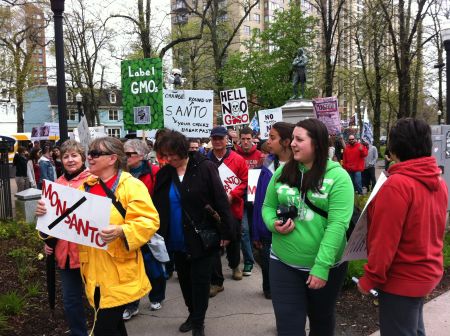Over 300 foodies, gardeners, growers, and activists took to the streets of Halifax Saturday as part of a global day of action in protest of multinational seed and insecticide manufacturing giant Monsanto, demanding the right to know what is in their food.
Event organizer Alycia Smith explained the goal of the march was " to spread awareness – we want people to know, because Monsanto doesn't want people to know what they're eating and we have a right to know what we're eating."
Many Monsanto seeds are genetically modified (GM) to increase plant resistance to herbicides sprayed on crops. While the company claims that GM foods produce no harmful effects for humans, critics say there have not been long-term studies to prove these claims.
Conscientious consumers argue that due to the lack of evidence for the safety of GM products there is a need to properly label these products so that shoppers can make informed decisions. Currently GM products are not labelled in Canada; however, there are websites such as the non-GMO shopping guide which indicate products that are known to be genetically modified.
Upon leaving Victoria Park the March Against Monsanto proceeded down Spring Garden Road to Halifax's Grand Parade Square, where speakers informed participants of available alternatives to purchasing GM food. Owen Bridge of Annapolis Seeds encouraged people to grow their own food and provided a variety of seed samples for tomato plants, squash, and beans, none of which are patented or owned by Monsanto.
Monsanto has been involved in a laundry list of court battles over the patents of their seeds, and the company has successfully sued farmers in the past for saving seeds and replanting crops using patented seeds. Monsanto also manufactures a line of herbicides and has previously manufactured harmful chemical products such as Agent Orange.
Joseph Currie of Prema Community Garden, a network of Halifax food growers, invited people to join Prema in creating urban community gardens, noting that "planting food is like printing money." Many consumers have become detached from the production of their food and in doing so are left no other choice but purchasing of their food in grocery stores. Growing food is an enjoyable experience for many, and Prema aims to provide those in need with a space to grow and learn about growing food. By bringing community members together, Prema hopes to create a stronger, more sustainable city.
Even if consumers don't have the time or knowledge to produce their own food, there are still things that can be done to diminish the market control of large corporations such as Monsanto, organizers said. Green Party of Nova Scotia leader John Percy states that "what you can do every day is vote with your wallet. Every purchase you make, every decision that you make that involves spending money benefits corporations."
Food-conscious consumers are perpetually seeking information as a way of avoiding GM food. Alycia Smith points to the organization Atlantic Canadian Organic Regional Network (ACORN) as a good starting place for individuals who are looking to educate themselves on how to grow organic foods or where it can be purchased. ACORN offers a look-up tool for people in search of local producers and retailers of organic food in Atlantic Canada.
When asked what people can do to avoid GM foods, Lil Macpherson, owner and operator of The Wooden Monkey restaurant in Halifax, responds: "don't eat anything in a package, honestly, it would be really good for you. Go to the farmers’ market, buy local vegetables, make your own treats." Macpherson hopes to host future events to bring food producers, government officials, and restaurateurs together to open up dialogue on food security and consumers’ right to know what is in their food.
While some wish to see GM foods banned in Canada, others just want to have GM products labelled. A petition was circulated at the March Against Monsanto addressed to the Canadian government urging that GM foods be labelled. People have a right to know how their food is produced, the petition said, and without proper labelling the task of identifying GM food is impossible.
Similar marches took place in countries around the world in defiance of Monsanto's increasingly dominant role in global food production. Alycia Smith stated that March Against Monsanto is "in over 50 countries and there are over 450 events taking place." While research is not complete, consumers are becoming aware of the possible dangers of GM food, and while the government has been slow to respond many people have chosen to educate themselves before making decisions on which products to purchase.
Click here for more photos of Saturday's march.



